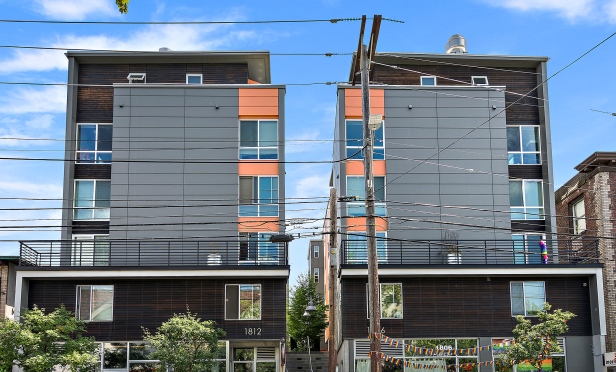 Three Footprint-branded micro apartment buildings in Seattle recently sold at full list price.
Three Footprint-branded micro apartment buildings in Seattle recently sold at full list price.
SEATTLE—Micro-units continue to make waves in this market, even though city regulations now prevent the development of this type of unit. However, the product remains in high demand among renters. As the Seattle apartment market embraces the delivery of the largest development pipeline in its history, less than 1% of new development is micro apartment units–ensuring little competition for decades to come.
The latest example is the sale of three Footprint-branded micro apartment buildings, each selling at full list price of $28.4 million total. Of those three buildings, two are located in Seattle's Capitol Hill neighborhood and the third is in the Eastlake neighborhood. A fourth building in the portfolio, located in the MadisonMiller neighborhood, is currently pending sale with a closing date this month.
Dylan Simon, Jerrid Anderson and Matt Laird of Colliers International brokered the transaction in the representation of the seller, Footprint Investments, after marketing the full eight-property portfolio. Four properties remain available for purchase (West Seattle, Greenwood, Phinney and Wallingford).
These properties are part of the late Jim Potter's legacy of innovation in apartment development and affordable living in Seattle. Potter founded Footprint Investments a decade ago, pioneering the creation of affordable housing in Seattle's best urban neighborhoods.
“Four years ago, when our team initially endeavored to be the first efficiency-unit experts in the nation, we ignored the pundits that questioned this new wave of small apartments,” says Anderson. “Closing the sale of these three properties at full list price is a testament to the lasting success of micro apartment units.”
When introduced to the market in 2009, average rental rates for micro apartments were $558 per month. Nearly 10 years later, average micro apartment rental rates such as for those in the Footprint Portfolio hover around $1,000 per month. That represents 80% cumulative rent growth and 6.7% sustained year-over-year rental rate growth for nearly a decade, according to a report by Colliers International.
“It is no secret Seattle has been impacted by record apartment deliveries year-over-year, causing an imbalance in supply and demand,” Anderson tells GlobeSt.com. “However, due to city council legislation, you can't build micro units in Seattle anymore, creating a limited supply and high demand.”
Anderson says 95% of the new supply of apartments in Seattle are considered luxury units appealing to affluent renters with few affordable options.
“It really comes down to what attracts the tenants and the Footprint Portfolio has all three: great locations, thoughtful design and affordability,” he tells GlobeSt.com. “The sheer magnitude of the portfolio sale attracted a wide pool of buyers from New York to Singapore.”
The buyer was not represented by a broker.
© Touchpoint Markets, All Rights Reserved. Request academic re-use from www.copyright.com. All other uses, submit a request to [email protected]. For more inforrmation visit Asset & Logo Licensing.







